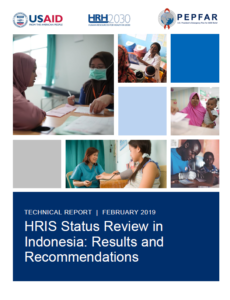28 Jun HRIS Status Review in Indonesia: Results and Recommendations
Indonesia has some of the highest maternal and neonatal death rates in the Asia Pacific region (in preventable deaths), is facing a growing HIV epidemic among vulnerable populations, and is seeing rising cases of drug-resistant tuberculosis. Underlying health workforce challenges, which include urban-rural maldistribution; gaps in skill mix of health graduates to meet the evolving epidemiological and demographic needs; inadequate regulation in both the education sector and labor market to ensure quality provision of services; and a fragmented ecosystem of HRH information platforms with disparate stakeholders, greatly contribute to the country’s health issues. While Indonesia’s information systems, infrastructure, and institutional capacity for data use are relatively strong, incomplete or limited quality data hinders effective data use to strategically address health workforce policy challenges.
In 2018, the Ministry of Health of Indonesia and HRH2030 administered the PEPFAR HRIS Assessment Framework (HAF) as a review of the functionality and capacity of the ministry’s human resource information system, SI-SDMK. The review resulted in a mapping of the flows of human resources for health (HRH) data, a mapping of stakeholders of HRH data, and documentation of motivations and barriers to data entry and use. Finally, the review team made recommendations to enhance the capacity of the SI-SDMK in support of improved interoperability, data analytics, and decentralized use of the system and data.
This report presents the HRIS status assessment review process, as well as the results of the review and recommendations, next steps, and lessons learned.
Associated Content:
Overview: HRH2030 HRIS Status Assessment activity
HRH2030 HRIS Assessment in Madagascar
HRH2030 HRIS Assessment in The Philippines
Supporting National Health Workforce Accounts (NHWAs)
Country: Indonesia
Resource Types: Report
Topic: HRIS Status Assessment
DOWNLOAD






